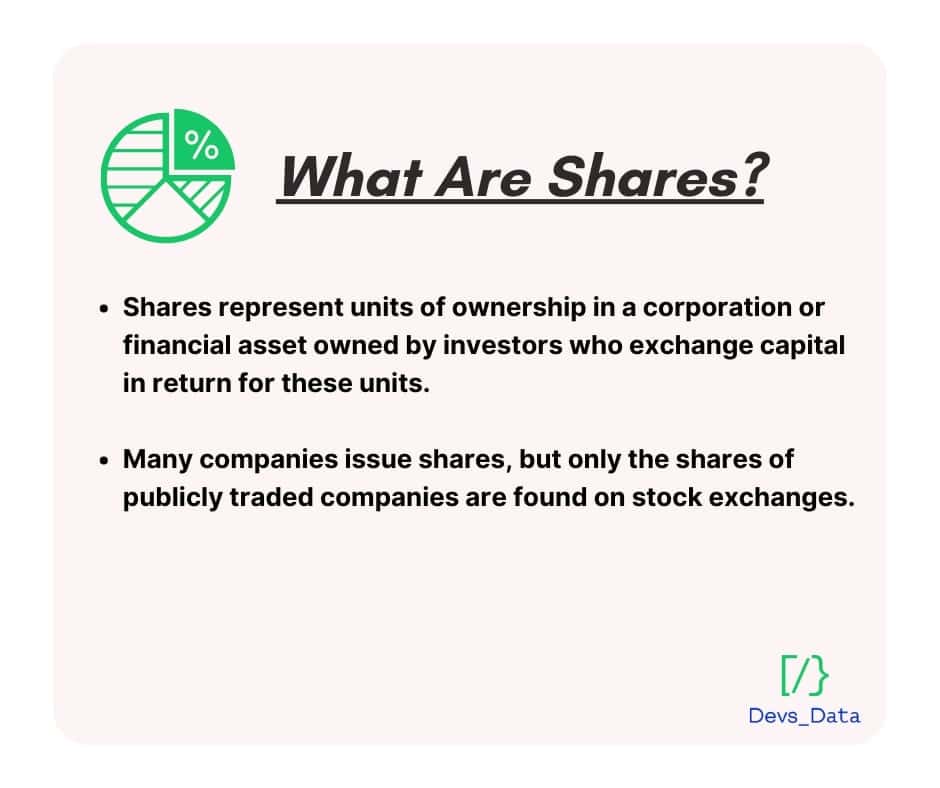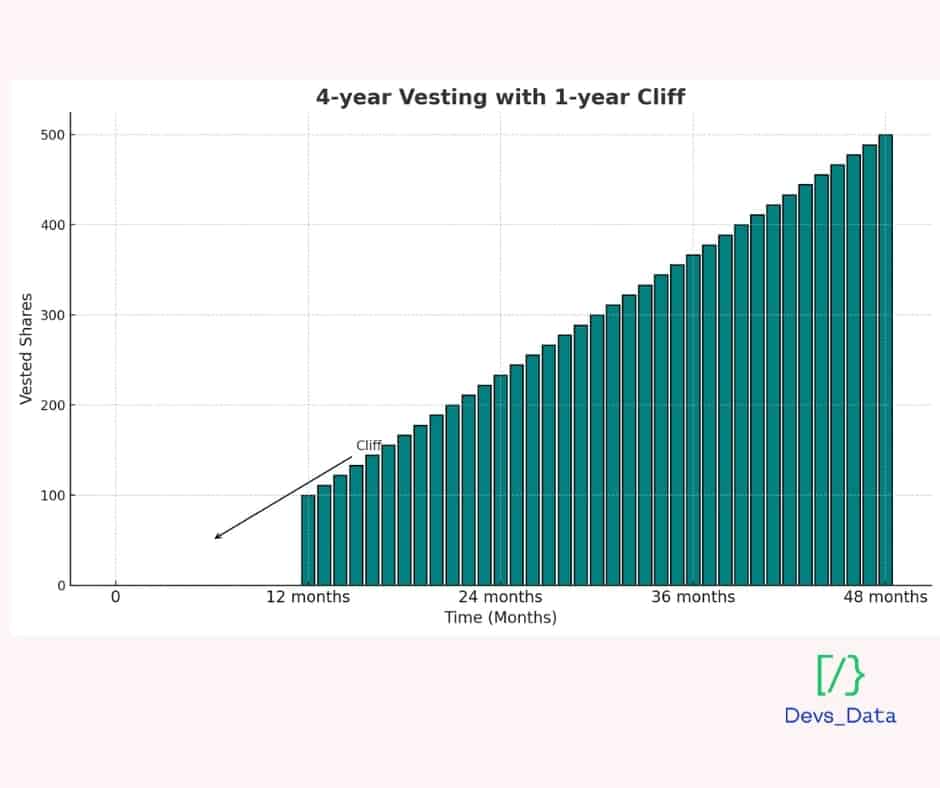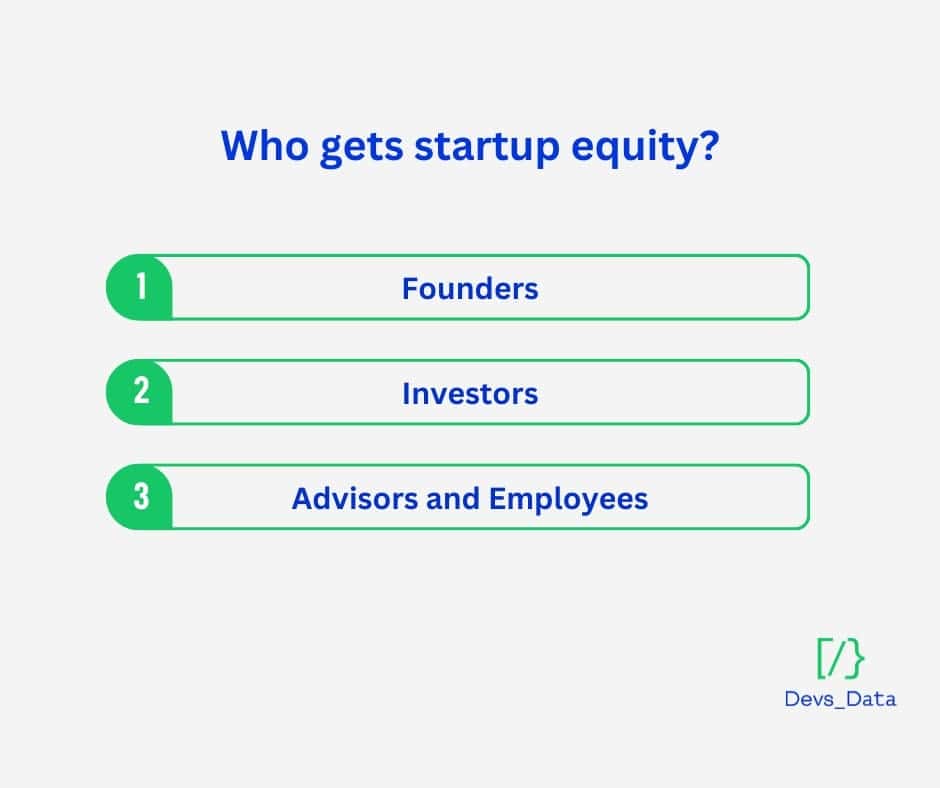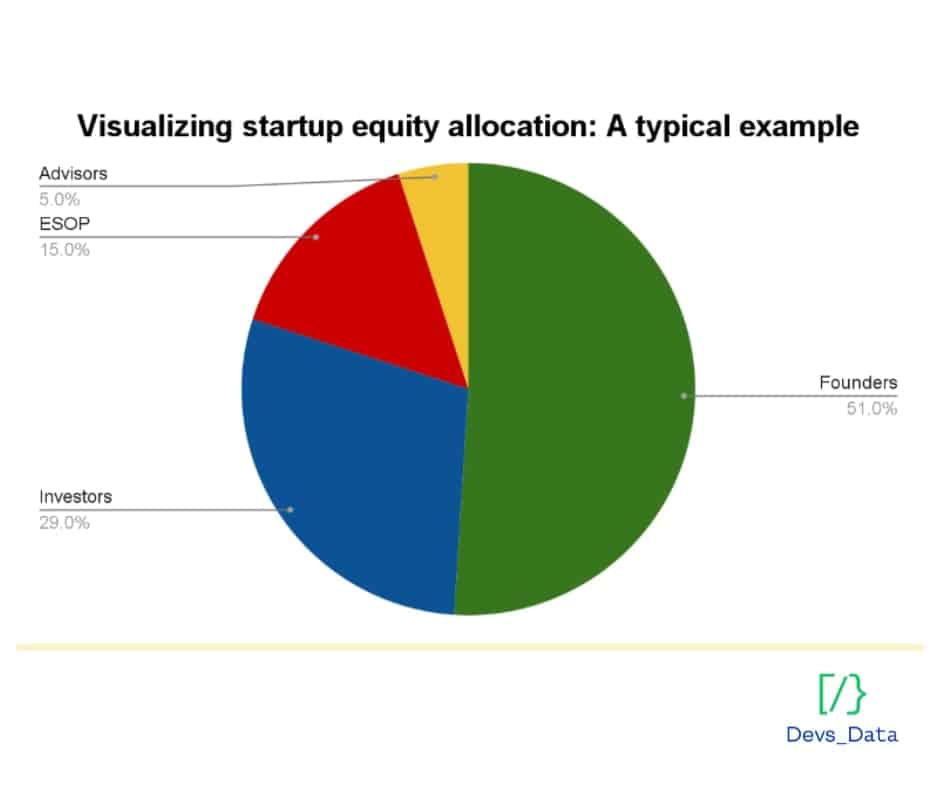


Launching a startup can be one of the most exciting and rewarding ventures—especially in the IT industry, where growth opportunities are immense. According to Statista, the global IT services market generated over $1290 billion in revenue in 2023, with projections estimating this figure to reach a staggering $1900 billion by 2029. But what separates a successful startup from the rest isn’t just a great idea or market timing—it’s strategic decision-making, particularly when allocating shares.
Allocating shares is more than just splitting ownership—it’s a tool to attract funding, motivate your team, and build a foundation for long-term success. Startups often face resource limits, but shares can be a powerful currency to secure talent and partnerships while aligning everyone’s goals with the company’s success.
Now, why is this important? Statistics show that a lack of funding is one of the most common reasons startups fail. According to CB Insights, in 2021, 38% of startups cited insufficient funds as their downfall. When allocated thoughtfully, shares can not only help avoid this pitfall but also foster a sense of shared purpose and commitment among founders, employees, and investors alike.
Let’s examine how shares work in a startup, who gets them, and how they should be allocated during the critical early phase all new companies go through!

For the sake of clarity, let’s define a share. It is a financial term denoting a unit of ownership within a company. Those who own shares are shareholders, meaning they are entitled to a company’s profits, have a say in decisions concerning its future, and shoulder some risks associated with changing market trends. It’s also essential to distinguish shareholders from stakeholders. While shareholders own a portion of the company, stakeholders encompass a broader group—anyone interested in the company’s performance, such as employees, customers, suppliers, and the local community. Stakeholders may not own shares but are affected by the company’s operations.
The total amount of shares a company has is known as the capitalization table, or “cap table” for short. Aside from founders, investors, employees, and, in some cases, advisors can also hold shares. While it’s essential to allocate shares in a way that makes everyone feel valued and respected, this doesn’t necessarily mean an equal split. Shares should be distributed relatively, reflecting each individual’s role, contribution, and obligations in the organization. For example, someone in a higher leadership position or with a more significant impact on the company’s growth may justifiably receive a larger share. Thoughtful allocation develops a great work culture and communicates to potential investors that the company is founded on strong, well-structured connections between its co-founders and stakeholders.
Another way to make investing in a startup more appealing is to diversify the types of shares founders and investors receive. Shares in a company can generally be divided into two categories: common and preferred.
Common shares typically grant voting rights, allowing shareholders to influence key company decisions, such as electing the board of directors. However, these voting rights can sometimes be limited, mainly when founders or key stakeholders create a dual-class share structure that concentrates voting power in specific hands, such as the founders or early investors. Preferred shares, on the other hand, usually do not provide voting rights or offer limited voting privileges. Instead, their primary appeal lies in financial advantages—they are given priority over common shares when distributing profits or during a liquidation event.
While the differences between common and preferred shares can raise concerns for founders about maintaining control and equity, implementing equity vesting schedules can help address these worries. Vesting schedules can ensure long-term commitment from team members while safeguarding the company’s stability.
| Feature | Common shares | Preferred shares |
|---|---|---|
| Voting rights | Yes | Sometimes limited |
| Priority in liquidation | No | Yes |
| Common usage | Founders, employees | Investors |
Cliff vesting is a type of equity vesting where employees become fully vested in their shares all at once on a specific date rather than gradually over time. An example of this is 3-year cliff vesting, as illustrated in the graph below.
| Full Year(s) of Service | Percentage of Vested Shares |
|---|---|
| 1 | 0% |
| 2 | 0% |
| 3 | 100% |
It requires meeting certain conditions, such as a time-based milestone (e.g., staying with the company for a year or more) or an event-based milestone (e.g., the company going public). For example, with a 1-year cliff vesting schedule, employees must remain with the company for at least one year to receive any equity; leaving before this period results in forfeiture of all benefits. Cliff vesting incentivizes long-term commitment while protecting companies from early departures.
Similarly, a 4-year cliff vesting plan requires employees to remain for 4 years to be fully vested, but this approach can be unappealing for young employees who, on average, switch jobs every 2.3 years. Many companies implement a 4-year vesting schedule with a 1-year cliff to address this. Under this structure, 25% of the shares vest after one year (e.g., 120 out of 480 shares), with the remaining shares vesting monthly over the next 3 years. This method, commonly used by private companies, strikes a balance by incentivizing long-term commitment while offering earlier access to equity.

Under this structure, employees earn 25% of their equity after completing one year (cliff). The remaining shares vest incrementally every month over the next 3 years, reaching full vesting (100%) at the end of the fourth year. This schedule rewards employees who remain with the company long-term.
The 4-year vesting with a 1-year cliff offers both benefits and challenges. It incentivizes employees to stay for at least one year, as no equity is vested before the cliff, and provides additional shares monthly after the first year, motivating longer tenure. For instance, an employee leaving on January 2, 2023, would still receive 240 vested shares. However, employees may fear termination just before their one-year mark, which can harm morale. A solution is to offer prorated shares to those who let go early, softening disappointment and reinforcing fairness and trust within the team.
By implementing vesting schedules, startups can foster loyalty and alignment among stakeholders, ensuring the company’s growth and stability.

As it was stated previously, shares within a startup are divided between founders, investors, and employees, but also advisors in some cases. Here are some things to consider regarding how these shares are divided. We’ll give more specifics in the next section.
Do you have IT recruitment needs?
The answer to the question varies depending on who you ask, but some constants remain. For example, founders typically retain a significant portion of equity, often around 50-70%, to maintain control and motivation. Y Combinator advises that equal equity splits among co-founders can enhance motivation and commitment. Additionally, research from Harvard Business School highlights the importance of thoughtful equity division to mitigate founder conflict and dissatisfaction.
It is also essential to consider how these 60% are divided. Each founder in the startup will undoubtedly play different roles, with only one being the “decision maker.” An equal split might communicate a lack of confidence to potential investors. While an uneven split could seem unfair, it shows the founders prioritize the company’s well-being and long-term success over individual benefit. This approach can further convince investors that the founders trust each other and are prepared to collaborate for years to come.
However, the split can’t be too uneven, as it will dilute further when investors join the fold. Usually, investors take up around 30% of the equity pool, leaving the remaining 10% for advisors and employees. If an investor owns more equity in a firm than one of the founders, it could be a bitter pill to swallow. However, it’s crucial to remember that sacrifices are sometimes necessary to secure funding. Co-founders should ensure they collectively hold the majority of equity, emphasizing the importance of trust among the founding team.
Dividing startup equity requires careful consideration of the roles and contributions of each stakeholder. The chart below shows a typical division of equity in an early-stage startup:

As shown in the chart:
Note: This is an example based on standard practices. Actual percentages can vary depending on factors like team size, funding stage, and strategic priorities.
Beyond the overall distribution shown in the chart, equity allocated to employees can take two primary forms:
While advisors are less common recipients of equity, they contribute high-value expertise, guidance, or networks essential for a startup’s growth. When granting equity to advisors, defining their role and ensuring the equity pool remains robust for employees and other stakeholders is vital.
The Slicing Pie model offers a structured and adaptable approach to dividing shares based on actual contributions, providing a fair and flexible framework for startups grappling with equity allocation. Often hailed as a leading methodology for equitable equity splits, Slicing Pie dynamically adjusts shares as contributions—such as time, money, or resources—evolve. This ensures fairness, particularly in startups with fluctuating involvement or uncertainty during their early stages.
The Slicing Pie model is highly regarded in the US for its ability to prevent equity-related disputes and align the team’s efforts with long-term objectives. Unlike fixed equity arrangements that may feel arbitrary or rigid, Slicing Pie emphasizes a performance-driven allocation, rewarding contributors based on their impact on the company. This mitigates conflicts and fosters trust among founders, employees, and investors.
Startups interested in implementing the Slicing Pie model can find detailed guidance, tools, and resources on its official website, which thoroughly outlines the methodology. Using a standardized formula, the model works by assigning a “slice” value to each contribution, whether it’s time, money, intellectual property, or other resources. These slices are tracked and dynamically adjusted as contributions evolve, ensuring each participant’s share reflects their real-time input. For example, unpaid work is valued based on market rates, while cash investments or expenses are weighted more heavily to account for the associated risk. By adopting this approach, founders can establish a fair, transparent equity-sharing framework that encourages team collaboration and positions the company for sustainable growth.
Granting equity and options to employees or contractors outside the US is feasible and can be an effective tool for building global teams. However, it’s essential to consider cultural perceptions and legal frameworks when implementing such compensation strategies internationally.
In regions like Eastern Europe, equity compensation may be undervalued due to limited exposure and differing cultural attitudes toward such incentives. Research indicates that cultural factors significantly influence compensation structures, with societies exhibiting higher levels of collectivism and uncertainty avoidance less inclined toward equity-based compensation.
To address these challenges:
Different countries have distinct tax treatments for equity compensation, which can create complexities for businesses operating globally. For instance, some jurisdictions may impose taxes when granting equity, while others may do so upon vesting or exercise. Understanding these nuances is essential to avoid unforeseen tax liabilities that could burden both the company and the employees.
In addition to tax considerations, local labor laws can significantly impact how equity awards are structured. These regulations influence factors such as employee eligibility and the classification of workers, making it critical to ensure that offering equity does not inadvertently alter an individual’s employment status or violate local labor standards.
Regulatory compliance presents another layer of complexity. Many countries have specific requirements for offering equity to employees, including adherence to securities laws or mandatory filings. Staying informed about these obligations ensures compliance and avoids potential legal or financial penalties. By addressing these challenges thoughtfully, companies can create practical and legally sound equity compensation plans for their international teams.
Best practices to address these challenges:
By acknowledging cultural differences and adhering to legal requirements, companies can effectively implement equity compensation strategies that resonate with international employees and contractors, fostering a cohesive and motivated global workforce.
Do you have IT recruitment needs?
Founders seeking guidance benefit greatly from trusted resources offering expert insights and practical advice. The Online Startup Accelerator is an excellent starting point, providing actionable insights into equity allocation, funding, and broader startup challenges. Podcasts such as the All-In Podcast dive deep into startup growth, funding strategies, and equity distribution, making it a must-listen for aspiring entrepreneurs. Influencers like Pieter Levels share firsthand experiences and practical advice on building and scaling startups, offering a unique perspective on navigating the startup journey.
Beyond these, other valuable podcasts include How I Built This by Guy Raz, which features inspiring interviews with successful company founders, and The Indie Hackers Podcast, where founders discuss bootstrapping and building sustainable businesses.
Books also serve as timeless resources for understanding the nuances of building a startup. Must-reads include “The Lean Startup” by Eric Ries, which emphasizes iterative growth and efficient use of resources, and “Zero to One” by Peter Thiel, which explores creating innovative businesses in competitive markets.
Founders can also explore online platforms like Y Combinator’s Startup Library, which features comprehensive guides and lectures on startup fundamentals, and First Round Review, offering tactical advice from experienced founders and investors. Engaging with these resources helps founders gain actionable knowledge and provides the inspiration and tools necessary to thrive in the fast-paced world of startups.
By leveraging a combination of podcasts, books, and platforms, founders can build a well-rounded understanding of the startup ecosystem, making these resources invaluable companions on the journey to success.
Website: www.devsdata.com
Team size: ~60 employees
Founded in: 2016
Headquarters: Brooklyn, NY and Warsaw, Poland
As startups grow, navigating challenges like equity allocation and scaling the business can be daunting. Partnering with DevsData LLC ensures smooth operations during these critical stages. With over 8 years of experience and a global presence spanning the US and Europe, DevsData offers tailored solutions that address both technical and business needs for startups. From accounting and payroll processing to HR administration and legal compliance, their specialized services enable founders to focus on scaling their ventures.
DevsData LLC provides a wide range of services designed to help startups succeed. These include recruiting top-tier talent, strategic consulting for IT and business processes, custom software development and specialized Big Data and Machine Learning solutions. Startups also benefit from HR and tax advisory services, including Employer of Record (EoR) support and Business Process Outsourcing (BPO) to manage backend operations like accounting and payroll. By offering such comprehensive support, DevsData allows startups to streamline their operations and confidently focus on growth.
Since its founding in 2016, DevsData LLC has completed over 83 projects across multiple countries, consistently earning 5/5 ratings on platforms like Clutch and GoodFirms. Their team includes Google-level engineers and developers with over a decade of experience in the startup ecosystem, making them an ideal partner for tackling complex technological challenges.
For instance, DevsData LLC partnered with a San Francisco-based startup incubator to design a custom landing page celebrating its 25th anniversary. Delivered within a challenging five-day timeframe, the microsite featured dynamic content activation, videos, a commenting section, and newsletter sign-up options. Leveraging HTML, CSS, JavaScript, and WordPress, the team ensured the solution was visually appealing, user-friendly, and easily manageable for non-technical users. This project highlights DevsData’s ability to deliver high-quality, customized web solutions for startups under tight deadlines.
Do you have IT recruitment needs?
For more details or to schedule a meeting with DevsData LLC, visit www.devsdata.com or email general@devsdata.com
As venture investments have considerably decreased over the recent years, and with more startups failing than they are succeeding, new founders need to explore the options at their disposal thoroughly to get their company off the ground and into a position where it can sustain itself.
To that end, dividing shares within a startup is a peculiar can of worms, necessitating a fine balance to respect everyone involved, secure the company’s long-term success, and protect it from running out of funds. It is a process that founders should approach with a lot of forward-thinking, taking into account not only their company but also potential investors and employees. They should also seek professional advice should it be needed and keep in mind further assistance as it could prove equally as important as they come across new challenges brought on by company growth. DevsData LLC, with over 8 years of experience supporting startups, can offer invaluable guidance and expertise in managing the complexities of business scaling, including equity management, legal compliance, and talent acquisition.
Defining equity distribution is essential in nearly every facet of a company’s business: it builds trust, attracts talent, and provides a strong foundation for growth, success, and sustainability.
Frequently asked questions (FAQ)
DevsData – your premium technology partner
DevsData is a boutique tech recruitment and software agency. Develop your software project with veteran engineers or scale up an in-house tech team of developers with relevant industry experience.
Free consultation with a software expert
🎧 Schedule a meeting
FEATURED IN


DevsData LLC is truly exceptional – their backend developers are some of the best I’ve ever worked with.”
Nicholas Johnson
Mentor at YC, serial entrepreneur


 Build your project with our veteran developers
Build your project with our veteran developers
 Explore the benefits of technology recruitment and tailor-made software
Explore the benefits of technology recruitment and tailor-made software
 Learn how to source skilled and experienced software developers
Learn how to source skilled and experienced software developers




Categories: Big data, data analytics | Software and technology | IT recruitment blog | IT in Poland | Content hub (blog)
